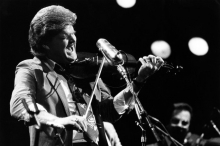Ricky Skaggs Rides Hot Pickin' From Rural Poverty to the Country Hall Of Fame

Billboard article
7/18/2018 by Tom Roland
Ricky Skaggs is celebrating his 64th birthday today in a slightly different atmosphere than he has ever observed it before, knowing that sometime this fall the Country Music Association will officially induct him into the Country Music Hall of Fame, placing his bronzed visage alongside plaques of some of his mentors, including Bill Monroe, Emmylou Harris and Lester Flatt & Earl Scruggs.
"I was doing something the other day and I thought, 'Hall of Fame, CMA, are you kidding?' " he says. "You know, it's a nice title, but gosh, it shouldn't change any of us. I'm still taking out the garbage and everything like that."
Skaggs enters the Hall in a unique position: a master of two genres. After Monroe's death in 1996, Skaggs recommitted himself to bluegrass, using his masterful pickin' ability to carry on the acoustic traditions set forth by Monroe, Flatt & Scruggs and Ralph Stanley, for whom he worked as a teenage member of The Clinch Mountain Boys in the 1970s.
But between that first run as a 'grasser and his efforts over the last two decades -- mostly with his own band, Kentucky Thunder -- there was an impressive, maybe even unlikely, detour into mainstream country where Skaggs successfully injected spiky mountain harmony into the genre during the Urban Cowboy era. It was a period when pop-tinged songs and even disco-associated Linn drums were the rule of the day, making Skaggs' triumphs then a bit of an anomaly.
Chalk that success up to sheer naivete. After touring with Stanley and a couple of his own bands, Skaggs joined Harris' Hot Band as a replacement for Rodney Crowell in 1977, working with her as she veered from country/rock toward the 'grass inflections of her Roses in the Snow album. So even though the format was slanted toward mass-appeal music at the time, Skaggs innocently chipped at the genre's flanks with covers of Flatt & Scruggs' "Don't Get Above Your Raisin'," Webb Pierce's "I Don't Care" and Monroe's "Uncle Pen."
"I honestly thought that everybody would love country and bluegrass like I did," he reflects.
He joined Reba McEntire and George Strait to form a trio of young artists who bucked the predominant trend and helped keep trad country alive in the early 1980s. While McEntire and Strait eased into their icon status, Skaggs rocketed in those early years, joining the Opry and winning two CMA awards in 1982 and claiming the CMA's entertainer of the year in 1985.
Skaggs managed the feat by balancing old-timey ideals -- lightnin' licks on mandolin, his rural-based lead voice and complex Stanley Brothers-influenced harmonies -- with clean production and then-modern country tones.
The idea, he says, was to make traditional country music that was fitting for radio but still stir it up a bit with the banjo, mandolin and fiddle while keeping pedal steel guitar and electric guitar solos prominent, not to mention finding good songs that had good harmonies. "I just had a sixth sense that something really, really different and really good could happen."
He went after it with a workaholic frenzy, developed in the lean atmosphere of Cordell, Ky., an Appalachian hole in the wall just 25 miles north of Loretta Lynn's birthplace in East Kentucky.
"Have you ever been to Ricky's house?" Country Music Hall of Fame and Museum CEO Kyle Young asked rhetorically when Skaggs' induction was announced in March. "It's amazing that he got out of there."
Talent helped. The prodigious Skaggs made his syndicated TV debut at the tender age of 6. His father, Hobert Skaggs, meanwhile provided a model for American pride, gritting through excruciating pain for years after a debilitating injury. "My dad had hurt his back really bad at that nuclear, atomic-energy plant over there in western Kentucky," recalls Skaggs. "As hard as it was for him to do much of anything -- he busted two vertebrae -- he just pushed through pain and he worked, because he knew he had responsibility. He didn't expect the government, or anybody, to take care of him."
Skaggs reached his own workaholic height in 1988 and 1989, simultaneously producing Dolly Parton's White Limozeen album and recording his own Kentucky Thunder. He has continued to stay fresh through occasional outside collaborations, recording a bluegrass-influenced album with Bruce Hornsby, teaming with Jack White's Raconteurs and Ashley Monroe on a CMA-nominated version of "Old Enough" and co-producing Hillary Scott & The Scott Family's Christian album Love Remains.
In the meantime, Skaggs is experiencing a little rebirth with some members of the younger generation. CMA CEO Sarah Trahern saw that firsthand when she watched the response to his CMA Music Festival performance at Nissan Stadium in June.
"People were singing along to 'Highway 40 Blues' that were probably not even born when it came out [in 1983]," she says. "That speaks to the generational interest, whether they learned something from their parents or they just hear it in their vernacular."
After years of playing bluegrass almost exclusively, Skaggs is doing a bit more of a balancing act between bluegrass and country as this fall's induction approaches. Thus, Nashvillians can expect a little of both when he plays a Bluegrass at the Ryman show on July 26. The concert will likely be a fair summation of the legacy that girds his coming induction in the Country Hall, just blocks away from that Ryman stage.
"It's still soaking in slowly," he says of the achievement. "I'm not making a big, big deal out of it, but it is a big deal."
Link:





